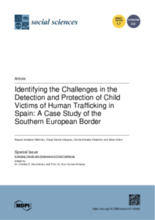Despite the improvements in enhanced child protection, there is an increasing concern about the vulnerability and cases of child trafficking in Spain, the southern gateway to Europe from the African continent. Analyzing 23 interviews with professionals in the field, this article identifies the factors that contribute to high levels of child trafficking in Spain.
This study identifies three primary results:
(1) The dangers of residential childcare as places of recruitment;
(2) The southern European and Spanish border as a place of elevated risk for the recruitment of children;
(3) The stereotypes regarding child trafficking make invisible male victims, other types of trafficking for nonsexual purposes, domestic trafficking, and individual trafficking.
Therefore, it remains imperative to advance a set of policies that:
(i) invest in specific residential childcare resources for child victims either alone or with family members;
(ii) invest in smaller residential childcare to prevent abuse;
(iii) invest in mentoring programs for children previously under state guardianship;
(iv) improve the working conditions and the training of residential childcare staff;
(v) increase the visibility and diversity of child trafficking while avoiding stereotypes;
(vi) improve the regional coordination;
(vii) invest in campaigns to inform children about the dangers involved in running away, exploitation and abuse.

